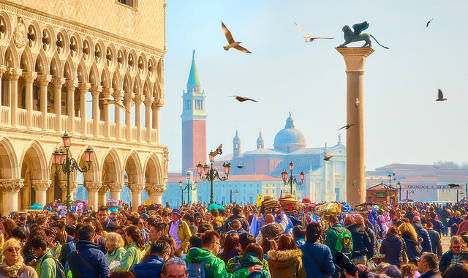Seeing a grown woman pull her trousers down in broad daylight to take a wee is enough to make anyone despair – let alone in one of the most famous cities in the world.
In full view of passersby, the woman, allegedly from Britain, shamelessly urinated by St Mark’s Square over the weekend.
She was snapped in the act by an angry gondolier, who shouted at her and told her to stop, only for her to allegedly swear back at him in English.
Just a week before, a reportedly drunk yacht worker from New Zealand jumped off the Rialto Bridge and smashed into a passing water taxi.
The 49-year-old, who was hospitalized with severe injuries, now faces charges of endangering public transport.
The city’s long-suffering mayor, Luigi Brugnaro, took to Twitter to vent his despair, threatening unruly sorts with jail.
A few days later flyers started to appear across the city, containing a blunt message from frustrated locals to tourists: “Tourists go away!!! You are destroying this area!”
Rarely a summer goes by without stories like these bringing the Unesco World Heritage site into the spotlight.
Brugnaro has made it his mission to crackdown on the industry that helps fill the canal city’s coffers ever since he was elected in June 2015.
“I insist on introducing special powers to the city to uphold public order. Pickpockets, vandals, drunks! A night in the cells,” he wrote on Twitter.
The city’s tourism councillor, Paola Mar, backs his non-nonsense approach.
“The situation does seem to get worse every year,” she told The Local.
“It happens in other major tourist places but when it happens in Venice it gets more exposed – once the newspapers have the story, that’s it.”

Photo: Moyan Brenn
Some 22 million pour into Venice each year, an excessive number which Brugnaro argues “risks flaring confrontation between tourists and residents”.
And while it’s not exactly a “hidden gem”, the city’s popularity endures – it came third in The Lonely Planet’s “best European destinations to visit this year” list, which was published in May.
It's so popular that Mar pointed to the significant growth in the number of tourists to the city – especially over the last few years – from far-flung places such as China and India.
In mid-July, it was reported that the city had seen a five percent uptick in tourist traffic so far this year, over 2015.
“Venice is a dream for everyone,” Mar said.
“And if we add the fact that people are avoiding other holiday destinations this year – such as Tunisia and Turkey – because of the fear of terrorist attacks, this adds pressure – and it’s unsustainable.”
The summer is a vulnerable time for Venice, but when it comes to the city’s image, Mar insists that “one or two fools” do not represent everyone.
“When you consider the sheer number of people who come, the majority of tourists respect the city and are well behaved.”
Aside from the local vigilantes who expose those misbehaving, the city has some 700 police officers, while people can be fined up to €250 for throwing rubbish in the canals or €50 for taking a dip.
Mar said most of the troublemakers are “day-trippers”.
She backs the suggestion by Brugnaro to jail drunken tourists who in anyway cause damage to the city during their stupor but said it would be very difficult to limit tourist numbers, as has been suggested by the mayor and by others in key Italian hotspots, such as Cinque Terre.
“We can’t simply ‘close’ the city – besides, it’s against the constitution,” she said.
“But what we can do is make sure that other destinations in Italy are better promoted, so we can share the tourist numbers.”



 Please whitelist us to continue reading.
Please whitelist us to continue reading.
Member comments